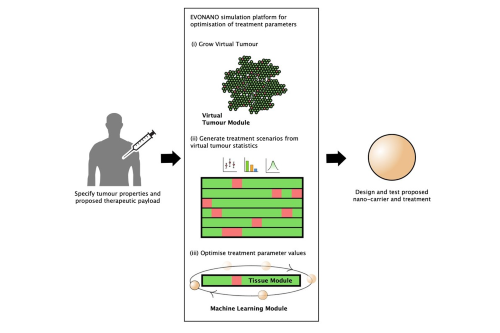By Amelie Heimann, Second Year, Biochemistry
Researchers at the University of Bristol have been involved in the creation of EVONANO, an artificial intelligence software that is revolutionising the field of cancer treatment.
The ground-breaking technology of EVONANO models specific tumours and designs nanoparticles that can combat that tumour.
Through the EVONANO platform researchers have been able to simulate different nanoparticle designs that have previously been ‘impossible to achieve experimentally’, according to Dr Sabine Hauert from the Department of Engineering Mathematics Cancer at the University.
The team hope that EVONANO can be engineered to use data from individual patients and create an exact replica of the patient’s tumour and find the optimum nanoparticle design to successfully erase the tumour.
Researches from @evo_nano developed a rich platform for testing hypotheses on the efficacy of nanoparticles for various tumour scenarios, enabling tweaking of nanoparticle parameters, which is experimentally nearly impossible:https://t.co/1ehn3GyQcj#nanoparticles #nanomedicine pic.twitter.com/9Cu86a70ee
— @EU_ProjectPACE (@EProjectpace) December 12, 2021
Nanoparticles are compact molecules that can act as vectors to carry drugs to specific cancer cells. Delivering drugs through nanoparticles has a distinct advantage to free drug delivery as it greatly increases the pharmacological parameters of bioavailability and drug uptake.
The researchers found that they could bioengineer the nanoparticles slightly differently by changing their size, shape, stiffness, and surface coating. The technique known as ‘artificial evolution’ is a way by which the nanoparticles can be engineered to reduce their harm to normal cells whilst still effectively killing cancerous cells.
In addition, different types of nanoparticles can be constructed such as encapsulated or self-assembling nanoparticles. Self-assembling nanoparticles harness thermodynamic forces to spontaneously assemble and deliver drugs effectively, researchers can modify this by external fields or templating.

The EVONANO platform also saves time by reducing the need to extensively test different nanoparticle designs in the laboratory.
A major advantage is that it minimses the high costs of frequent laboratory testing and it can model the effects of nanoparticles equivalent to in silica testing. Testing nanoparticles with a whole tissue is known to be inefficient so instead the team created models of individual cells.
The platform is an open-source software, meaning that it is available for use by other researchers and the hope is that through the scientific community the use of this technology will become widely used and effective.
Yes we can-cer: shrinking tumours by boosting the immune system
‘Carbon Dots’: Bristol University scientists spearhead sustainable alternative to growing crops
The creation of the EVONANO platform is an immense step forward in engineering treatments that are effective and personalised for cancer patients. Successfully treating all types of cancer remains to be one of the greatest enigmas of science and with the field of nanomedicine hopefully we are one step forward towards the goal of eliminating this disease.
Featured Image: Unsplash/Alexander Sinn
Where do you think artificial intelligence could take us in the future?









